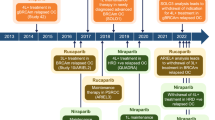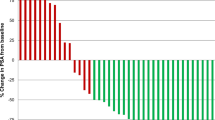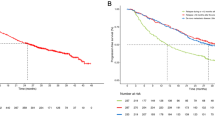Abstract
Docetaxel (Taxotere®) is a well established anti-mitotic chemotherapy agent. Among other therapeutic indications, docetaxel plus prednisone is indicated for first-line chemotherapy in patients with castration-resistant prostate cancer (CRPC).
Docetaxel every 3 weeks plus continuous prednisone has been standard first-line chemotherapy in CRPC since demonstrating improved survival compared with the previous standard regimen, mitoxantrone plus prednisone, in the phase III TAX 327 trial in 2004. Since that time, docetaxel has been combined with various agents that demonstrated additive or synergistic activity in preclinical studies in an effort to further improve outcomes, but to date, overall survival has not been extended compared with docetaxel plus prednisone. However, several promising agents are emerging with a potential role in docetaxel-based combinations based on efficacy and manageable toxicity, including bevacizumab, dasatinib and atrasentan.
In the TAX 327 trial, neutropenia was relatively common in the group receiving 3-weekly docetaxel plus prednisone, but infection was rare. The tolerability of a weekly docetaxel regimen also administered in this trial was not significantly different to that of the 3-weekly regimen, except for a lower incidence of grade 3 or 4 neutropenia. However, weekly or 2-weekly docetaxel administration schedules may have a place in very elderly or frail patients in order to improve tolerability compared with the 3-weekly regimen.
In conclusion, docetaxel every 3 weeks plus prednisone remains the optimum first-line chemotherapy for most patients with advanced CRPC until such time that ongoing research with docetaxel and emerging therapeutic agents can demonstrate improved survival.



Similar content being viewed by others
Change history
10 December 2012
An Erratum to this paper has been published: https://doi.org/10.2165/11635570-000000000-00000
References
Jemal A, Bray F, Center MM, et al. Global cancer statistics. CA Cancer J Clin 2011; 61(2): 69–90
NCCN clinical practice guidelines in oncology (NCCN guideline): prostate cancer [online]. Available from URL: http://www.nccn.org/professionals/physician_gls/pdf/prostate.pdf [Accessed 2012 Apr 10]
Di Lorenzo G, Buonerba C, Autorino R, et al. Castration-resistant prostate cancer: current and emerging treatment strategies. Drugs 2010; 70(8): 983–1000
Armstrong AJ, Tannock IF, de Wit R, et al. The development of risk groups in men with metastatic castration-resistant prostate cancer based on risk factors for PSA decline and survival. Eur J Cancer 2010; 46(3): 517–25
Tannock IF, de Wit R, Berry WR, et al. Docetaxel plus prednisone or mitoxantrone plus prednisone for advanced prostate cancer. N Engl J Med 2004 Oct 7; 351(15): 1502–12
Pienta KJ. Preclinical mechanisms of action of docetaxel and docetaxel combinations in prostate cancer. Semin Oncol 2001 Aug; 28(4 Suppl. 15): 3–7
European Medicines Agency. Taxotere®: summary of product characteristics [online]. Available from URL: http://www.ema.europa.eu [Accessed 2012 May 16]
Sanofi-Aventis. Taxotere® (docetaxel) injection concentrate: US prescribing information [online]. Available from URL:http://products.sanofi.us/Taxotere [Accessed 2012 May 16]
Zhu M-L, Horbinski CM, Garzotto M, et al. Tubulin-targeting chemotherapy impairs androgen receptor activity in prostate cancer. Cancer Res 2010; 70(20): 7992–8002
Li Y, Hong X, Hussain M, et al. Gene expression profiling revealed novel molecular targets of docetaxel and estramustine combination treatment in prostate cancer cells. Mol Cancer Ther 2005 Mar; 4(3): 389–98
Ortholan C, Durivault J, Hannoun-Levi JM, et al. Bevacizumab/docetaxel association is more efficient than docetaxel alone in reducing breast and prostate cancer cell growth: a new paradigm for understanding the therapeutic effect of combined treatment. Eur J Cancer 2010 Nov; 46(16): 3022–36
Koreckij T, Nguyen H, Brown LG, et al. Dasatinib inhibits the growth of prostate cancer in bone and provides additional protection from osteolysis. Br J Cancer 2009; 101(2): 263–8
Henry JY, Lu L, Adams M, et al. Lenalidomide enhances the anti-prostate cancer activity of docetaxel in vitro and in vivo. Prostate 2012 Jun; 72(8): 856–67
Banerjee S, Hussain M, Wang Z, et al. In vitro and in vivo molecular evidence for better therapeutic efficacy of ABT-627 and taxotere combination in prostate cancer. Cancer Res 2007; 67(8): 3818–26
Ullen A, Lennartsson L, Harmenberg U, et al. Additive/synergistic antitumoral effects on prostate cancer cells in vitro following treatment with a combination of docetaxel and zoledronic acid. Acta Oncol 2005; 44(6): 644–50
Epplen R, Stockle M, Engelmann U, et al. Differential effects of ibandronate, docetaxel and farnesol treatment alone and in combination on the growth of prostate cancer cell lines. Acta Oncol 2011 Jan; 50(1): 127–33
Desarnaud F, Geck P, Parkin C, et al. Gene expression profiling of the androgen independent prostate cancer cells demonstrates complex mechanisms mediating resistance to docetaxel. Cancer Biol Ther 2011 Jan 15; 11(2): 204–12
O’Neill AJ, Prencipe M, Dowling C, et al. Characterisation and manipulation of docetaxel resistant prostate cancer cell lines. Mol Cancer 2011; 10: 126
Franke RM, Carducci MA, Rudek MA, et al. Castration-dependent pharmacokinetics of docetaxel in patients with prostate cancer. J Clin Oncol 2010 Oct 20; 28(30): 4562–7
McKeage Keam SJ. Docetaxel in hormone-refractory metastatic prostate cancer. Drugs 2005; 65(16): 2287–94
Petrylak DP, Tangen CM, Hussain MH, et al. Docetaxel and estramustine compared with mitoxantrone and prednisone for advanced refractory prostate cancer. N Engl J Med 2004 Oct 7; 351(15): 1513–20
Kelly WK, Halabi S, Carducci M, et al. Randomized, double-blind, placebo-controlled phase III trial comparing docetaxel and prednisone with or without bevacizumab in men with metastatic castration-resistant prostate cancer: CALGB 90401. J Clin Oncol 2012 May 1; 30(13): 1534–40
Machiels J-P, Mazzeo F, Clausse M, et al. Prospective randomized study comparing docetaxel, estramustine, and prednisone with docetaxel and prednisone in metastatic hormone-refractory prostate cancer. J Clin Oncol 2008; 26(32): 5261–8
Scher HI, Jia X, Chi K, et al. Randomized, open-label phase III trial of docetaxel plus high-dose calcitriol versus docetaxel plus prednisone for patients with castration-resistant prostate cancer. J Clin Oncol 2011 Jun; 29(16): 2191–8
Kellokumpu-Lehtinen P, Harmenberg U, Joensuu TK, et al. Phase III, randomized, open-label study of triweekly versus biweekly docetaxel (T) as a treatment for advanced hormone-refractory prostate cancer (HRPC): final analysis of the Finnish Uro-Oncological Group Study 1-2003 [abstract no. 4527]. 47th Annual Meeting of the American Society of Clinical Oncology; 2011 Jun 3–7; Chicago (IL)
Berry DL, Moinpour CM, Jiang CS, et al. Quality of life and pain in advanced stage prostate cancer: results of a Southwest Oncology Group randomized trial comparing docetaxel and estramustine to mitoxantrone and prednisone. J Clin Oncol 2006; 24(18): 2828–35
Berthold DR, Pond GR, Soban F, et al. Docetaxel plus prednisone or mitoxantrone plus prednisone for advanced prostate cancer: updated survival in the TAX 327 study. J Clin Oncol 2008 Jan 10; 26(2): 242–5
Berthold DR, Pond GR, Roessner M, et al. Treatment of hormone-refractory prostate cancer with docetaxel or mitoxantrone: relationships between prostate-specific antigen, pain, and quality of life response and survival in the TAX-327 study. Clin Cancer Res 2008; 14(9): 2763–7
Armstrong AJ, Garrett-Mayer E, Yang Y-CO, et al. Prostate-specific antigen and pain surrogacy analysis in metastatic hormone-refractory prostate cancer [published erratum appears in J Clin Oncol 2008 Feb 10; 26 (5): 820]. J Clin Oncol 2007 Sep 1; 25(25): 3965–70
Naito S, Tsukamoto T, Koga H, et al. Docetaxel plusprednisolone for the treatment of metastatic hormone-refractory prostate cancer: a multicenter phase II trial in Japan. Jpn J Clin Oncol 2008; 38(5): 365–72
Miyake H, Sakai I, Terakawa T, et al. Oncological outcome of docetaxel-based chemotherapy for Japanese men with metastatic castration-resistant prostate cancer. Urol Oncol. Epub2011 Jul 20
Miura N, Numata K, Kusuhara Y, et al. Docetaxel-prednisolone combination therapy for Japanese patients with hormone-refractory prostate cancer: a single institution experience. Jpn J Clin Oncol 2010; 40(11): 1092–8
Shimabukuro T, Sakano S, Matsuda K, et al. Can docetaxel therapy improve overall survival from primary therapy compared with androgen-deprivation therapy alone in Japanese patients with castration-resistant prostate cancer? A multi-institutional cooperative study. Int J Clin Oncol. Epub 2011 Nov 3
Kume H, Suzuki M, Fujimura T, et al. Docetaxel as a vital option for corticosteroid-refractory prostate cancer. Int Urol Nephrol 2011 Dec; 43(4): 1081–7
Beer TM, Ryan CW, Venner PM, et al. Double-blinded randomized study of high-dose calcitriol plus docetaxel compared with placebo plus docetaxel in androgen-independent prostate cancer: a report from the ASCENT Investigators. J Clin Oncol 2007 Feb 20; 25(6): 669–74
Caffo O, Sava T, Comploj E, et al. Docetaxel, with or without estramustine phosphate, as first-line chemotherapy for hormone-refractory prostate cancer: results of a multicentre, randomized phase II trial. BJU Int 2008; 102(9): 1080–5
Eymard J-C, Priou F, Zannetti A, et al. Randomized phase II study of docetaxel plus estramustine and single-agent docetaxel in patients with metastatic hormone-refractory prostate cancer. Ann Oncol 2007; 18(6): 1064–70
Caffo Sava T, Comploj E, et al. Impact of docetaxel-based chemotherapy on quality of life of patients with castration-resistant prostate cancer: results from a prospective phase II randomized trial. BJU Int 2011; 108(11): 1825–32
Nelius T, Klatte T, Yap R, et al. A randomized study of docetaxel and dexamethasone with low- or high-dose estramustine for patients with advanced hormone-refractory prostate cancer. BJU Int 2006; 98(3): 580–5
Oudard S, Banu E, Beuzeboc P, et al. Multicenter randomized phase II study of two schedules of docetaxel, estramustine, and prednisone versus mitoxantrone plus prednisone in patients with metastatic hormone-refractory prostate cancer. J Clin Oncol 2005; 23(15): 3343–51
Hahn NM, Marsh S, Fisher W. Hoosier Oncology Group randomized phase II study of docetaxel, vinorelbine, and estramustine in combination in hormone-refractory prostate cancer with pharmacogenetic survival analysis. Clin Cancer Res 2006 Oct; 12(20): 6094–9
Chi KN, Hotte SJ, Yu EY, et al. Randomized phase II study of docetaxel and prednisone with or without OGX-011 in patients with metastatic castration-resistant prostate cancer. J Clin Oncol 2010; 28(27): 4247–54
Sonpavde G, Matveev V, Burke JM, et al. Randomized phase II trial of docetaxel plus prednisone in combination with placebo or AT-101, an oral small molecule Bcl-2 family antagonist, as first-line therapy for metastatic castration-resistant prostate cancer. Ann Oncol 2012 Jul; 23(7): 1803–8
Petrioli R, Pascucci A, Conca R, et al. Docetaxel and epirubicin compared with docetaxel and prednisone in advanced castrate-resistant prostate cancer: a randomised phase II study. Br J Cancer 2011 Feb 15; 104(4): 613–9
Chittoor S, Berry W, Loesch D, et al. Phase II study of low-dose docetaxel/estramustine in elderly patients or patients aged 18–74 years with hormone-refractory prostate cancer. Clin Genitourin Cancer 2006; 5(3): 212–8
Dawson NA, Halabi S, Ou S-S, et al. A phase II study of estramustine, docetaxel, and exisulind in patients with hormone-refractory prostate cancer: results of cancer and leukemia group B trial 90004. Clin Genitourin Cancer 2008; 6(2): 110–6
Efstathiou E, Bozas G, Kostakopoulos A, et al. Combination of docetaxel, estramustine phosphate, and zoledronic acid in androgen-independent metastatic prostate cancer: efficacy, safety, and clinical benefit assessment. Urology 2005 Jan; 65(1): 126–30
Kikuno N, Urakami S, Nakamura S, et al. Phase-II study of docetaxel, estramustine phosphate, and carboplatin in patients with hormone-refractory prostate cancer. Eur Urol 2007; 51(5): 1252–8
Nakagami Y, Ohori M, Sakamoto N, et al. Safety and efficacy of docetaxel, estramustine phosphate and hydrocortisone in hormone-refractory prostate cancer patients. Int J Urol 2010; 17(7): 629–34
Nelius T, Reiher F, Lindenmeir T, et al. Characterization of prognostic factors and efficacy in a phase-II study with docetaxel and estramustine for advanced hormone refractory prostate cancer. Onkologie 2005; 28(11): 573–8
Oh WK, Halabi S, Kelly WK, et al. A phase II study of estramustine, docetaxel, and carboplatin with granulocyte-colony-stimulating factor support in patients with hormone-refractory prostate carcinoma. Cancer 2003 Dec; 98(12): 2592–8
Picus J, Halabi S, Kelly WK, et al. A phase 2 study of estramustine, docetaxel, and bevacizumab in men with castrate-resistant prostate cancer: results from Cancer and Leukemia Group B Study 90006. Cancer 2011 Feb 1; 117(3): 526–33
Buch-Hansen TZ, Bentzen L, Hansen S, et al. Phase I/II study on docetaxel, gemcitabine and prednisone in castrate refractory metastatic prostate cancer. Cancer Chemother Pharmacol 2010 Jul; 66(2): 295–301
Ferrero J-M, Chamorey E, Oudard S, et al. Phase II trial evaluating a docetaxel-capecitabine combination as treatment for hormone-refractory prostate cancer. Cancer 2006; 107(4): 738–45
Garcia JA, Hutson TE, Shepard D, et al. Gemcitabine and docetaxel in metastatic, castrate-resistant prostate cancer: results from a phase 2 trial. Cancer 2011 Feb 15; 117(4): 752–7
Kolodziej M, Neubauer MA, Rousey SR, et al. Phase II trial of docetaxel/capecitabine in hormone-refractory prostate cancer. Clin Genitourin Cancer 2006; 5(2): 155–61
Armstrong AJ, Creel P, Turnbull J, et al. A phase I–II study of docetaxel and atrasentan in men with castration-resistant metastatic prostate cancer. Clin Cancer Res 2008 Oct 1; 14(19): 6270–6
Ning Y-M, Gulley JL, Arlen PM, et al. Phase II trial of bevacizumab, thalidomide, docetaxel, and prednisone in patients with metastatic castration-resistant prostate cancer. J Clin Oncol 2010; 28(12): 2070–6
Zurita AJ, George DJ, Shore ND, et al. Sunitinib in combination with docetaxel and prednisone in chemotherapy-naive patients with metastatic, castration-resistant prostate cancer: a phase 1/2 clinical trial. Ann Oncol 2012; 23(3): 688–94
US National Institutes of Health. ClinicalTrials.gov [online]. Available from URL: http://www.clinicaltrials.gov [Accessed 2012 May 30]
Italiano A, Ortholan C, Oudard S, et al. Docetaxel-based chemotherapy in elderly patients (age 75 and older) with castration-resistant prostate cancer. Eur Urol 2009; 55(6): 1368–76
Takaha N, Okihara K, Kamoi K, et al. Feasibility of tri-weekly docetaxel-based chemotherapy for elderly patients (age 75 and older) with castration-resistant prostate cancer. Urol Int 2011; 87(3): 263–9
Hervonen P, Joensuu H, Joensuu T, et al. Biweekly docetaxel is better tolerated than conventional three-weekly dosing for advanced hormone-refractory prostate cancer. Anticancer Res 2012 Mar; 32(3): 953–6
Nishimura K, Nonomura N, Hashine K, et al. Prolonged treatment with three-weekly docetaxel plus daily prednisolone for metastatic castration-resistant prostate cancer: a multicenter, phase II, open-label, non-comparative, extension study in Japan. Int J Clin Oncol. Epub 2012 Feb 21
Mera T, Saijo N, Akaza H. Safety and efficacy of docetaxel in prostate cancer patients: based on the post-marketing surveillance in Japan [in Japanese]. Gan To Kagaku Ryoho 2012 Apr; 39(4): 551–62
Qi W-X, Shen Z, Yao Y. Docetaxel-based therapy with or without estramustine as first-line chemotherapy for castration-resistant prostate cancer: a meta-analysis of four randomized controlled trials. J Cancer Res Clin Oncol 2011; 137(12): 1785–90
Data on file, Sanofi Japan, 2012
Japanese Urological Association. Prostate cancer guidelines. Tokyo: Kanehara Co. Ltd, 2012
Lubiniecki GM, Berlin JA, Weinstein RB, et al. Thromboembolic events with estramustine phosphate-based chemotherapy in patients with hormone-refractory prostate carcinoma: results of a meta-analysis. Cancer 2004 Nov; 101(12): 994–1000
Ravery V, Fizazi K, Oudard S, et al. The use of estramustine phosphate in the modern management of advanced prostate cancer. BJU Int 2011; 108(11): 1782–6
Nakano K, Ohta S, Komatsu et al. Docetaxel with or without estramustine for estramustine refractory castration-resistant prostate cancer: a single institution experience. BMC Urol 2012; 12: 3
Fizazi K, Carducci M, Smith M, et al. Denosumab versus zoledronic acid for treatment of bone metastases in men with castration-resistant prostate cancer: a randomised, double-blind study. Lancet 2011; 377(9768): 813–22
Galsky MD, Vogelzang NJ. Docetaxel-based combination therapy for castration-resistant prostate cancer. Ann Oncol 2010; 21(11): 2135–44
Pond GR, Armstrong AJ, Wood BA, et al. Evaluating the value of number of cycles of docetaxel and prednisone in men with metastatic castration-resistant prostate cancer. Eur Urol 2012; 61(2): 363–9
Scher HI, Halabi S, Tannock I, et al. Design and end points of clinical trials for patients with progressive prostate cancer and castrate levels of testosterone: recommendations of the Prostate Cancer Clinical Trials Working Group. J Clin Oncol 2008; 26(7): 1148–59
Mountzios I, Bournakis E, Efstathiou E, et al. Intermittent docetaxel chemotherapy in patients with castrate-resistant prostate cancer. Urology 2011 Mar; 77(3): 682–7
Soga N, Kato M, Nishikawa et al. Intermittent docetaxel therapy with estramustine for hormone-refractory prostate cancer in Japanese patients. Int J Clin Oncol 2009; 14(2): 130–5
Caffo O, Pappagallo G, Brugnara S, et al. Multiple rechallenges for castration-resistant prostate cancer patients responding to first-line docetaxel: assessment of clinical outcomes and predictive factors. Urology 2012; 79(3): 644–9
Petrylak DP, Ankerst DP, Jiang CS, et al. Evaluation of prostate-specific antigen declines for surrogacy in patients treated on SWOG 99-16. J Natl Cancer Inst 2006; 98(8): 516–21
Nelius T, Filleur S. PSA surge/flare-up in patients with castration-refractory prostate cancer during the initial phase of chemotherapy. Prostate 2009; 69(16): 1802–7
de Bono JS, Scher HI, Montgomery RB, et al. Circulating tumor cells predict survival benefit from treatment in metastatic castration-resistant prostate cancer. Clin Cancer Res 2008; 14(19): 6302–9
Author information
Authors and Affiliations
Corresponding author
Additional information
Various sections of the manuscript reviewed by: O. Caffo, Medical Oncology Department, Santa Chiara Hospital, Trento, Italy; T. Nelius, Department of Urology, Texas Tech University Health Sciences Center, Lubbock, TX, USA; R. Petrioli, Medical Oncology Unit, University of Siena, Siena, Italy; G.R. Pond, Department of Oncology, McMaster University and Ontario Clinical Oncology Group, Hamilton, ON, Canada.
Data Selection
Sources: Medical literature (including published and unpublished data) on ‘docetaxel’ was identified by searching databases (including MEDLINE and EMBASE) for articles published since 1996, bibliographies from published literature, clinical trial registries/databases and websites (including those of regional regulatory agencies and the manufacturer). Additional information (including contributory unpublished data) was also requested from the company developing the drug.
Search strategy: MEDLINE and EMBASE search terms were ‘docetaxel’ and ‘castration-resistant metastatic prostate cancer’. Searches were last updated 16 July 2012.
Selection: Studies in patients with castration-resistant metastatic prostate cancer who received docetaxel. Inclusion of studies was based mainly on the methods section of the trials. When available, large, well controlled trials with appropriate statistical methodology were preferred. Relevant pharmacodynamic and pharmacokinetic data are also included.
Index terms: Docetaxel, androgen-independent metastatic prostate cancer, castration-resistant metastatic prostate cancer, hormone-refractory metastatic prostate cancer, pharmacodynamics, pharmacokinetics, therapeutic use.
Rights and permissions
About this article
Cite this article
McKeage, K. Docetaxel. Drugs 72, 1559–1577 (2012). https://doi.org/10.2165/11209660-000000000-00000
Published:
Issue Date:
DOI: https://doi.org/10.2165/11209660-000000000-00000




